KUSA JĀTAKA
-
Save
This was a tale the Master, while dwelling at Jetavana, told about a backsliding Brother.
The story runs that he was of noble birth and lived at Sāvatthi. On wholeheartedly embracing the Faith, he adopted the ascetic life. One day, as he was going his rounds for alms in Sāvatthi, he met a fair lady and fell in love with her at first sight. Overcome by his passion, he lived an unhappy life, letting his nails and hair grow long and wearing soiled robes. He pined away and became quite sallow, with all his veins standing out on his body.
Just as in the angel-world, those destined to fall from their heavenly existence manifest five well-known signs—namely, their garlands wither, their robes soil, their bodies grow ill-favoured, perspiration pours from their armpits, and they no longer find pleasure in their angel-home—so too, in the case of worldly Brethren who fall from the Faith, the same five signs are to be seen: the flowers of faith wither, the robes of righteousness soil, through discontent and the effects of an evil name their persons grow ill-favoured, the sweat of corruption streams from them, and they no longer delight in a life of solitude at the foot of forest trees. All these signs were to be found in him.
So they brought him into the presence of the Master, saying, “Holy Sir, this fellow is discontented.”
The Master asked if it were true, and on his confessing that it was, he said, “Brother, be not the slave of sin. This is a wicked woman; overcome your passion for her, and take pleasure in the Faith. Verily, through falling in love with a woman, sages of old, mighty though they were, lost their power and came to misery and destruction.”
And so saying, he told a story of the past.
Once upon a time, in the Malla kingdom, in the royal city of Kusavati, King Okkaka ruled his realm righteously. Among his sixteen thousand wives, the chief was Silavati, his queen consort. Yet she had neither son nor daughter, and the men of the city, along with all his subjects, assembled at the palace door, complaining that the kingdom would utterly perish.
The king opened his window and said, “Under my rule, no man worketh iniquity. Wherefore do ye reproach me?”
“True, Sire,” they answered, “no one worketh iniquity, but no son is born to you to perpetuate the race: a stranger will seize the kingdom and destroy it. Therefore, pray for a son who can rule your kingdom righteously.”
“In my desire for a son, what am I to do?”
“First of all, send into the streets, for a whole week, a band of dancing women of low degree—giving the act a religious sanction—and if one of them shall give birth to a son, well and good. Otherwise, send a company of fairly good standing, and finally a band of the highest rank. Surely, amongst so many, one woman will be found of sufficient merit to bear a son.”
The king did as they bade him, and every seventh day he inquired of all who had returned, after taking their fill of pleasure, whether any had conceived. When they all answered, “No, Sire,” the king fell into despair and cried, “No son will be born to me.”
The men of the city again reproached him as before. The king said, “Why do ye reproach me? At your bidding, companies of women were exposed in the streets, and no one of them has conceived. What now am I to do?”
“Sire,” they answered, “these women must be immoral and void of merit. They do not possess sufficient merit to conceive a son. But because they do not conceive, you are not to relax your efforts. The queen consort, Silavati, is a virtuous woman. Send her out into the streets; a son will be born to her.”
The king readily assented and proclaimed, by beat of drum, that on the seventh day from that time, the people were to assemble, and the king would expose Silavati—giving the act a religious character. On the appointed day, he had the queen magnificently arrayed, carried her down from the palace, and exposed her in the streets. By the power of her virtue, the abode of Sakka manifested signs of heat.
Sakka, considering what this might mean, realized that the queen was anxious for a son and thought, “I must grant her a son.” While wondering whether there was anyone in the angel-world worthy to be her son, he beheld the Bodhisatta. At that time, having passed through his existence in the heaven of the Thirty-three, he was longing to be born in a higher world.
Sakka came to the door of his dwelling-place and summoned him forth, saying, “Sir, you are to go to the world of men and be conceived as the child of Okkaka’s chief consort.” He then gained the consent of another divine being and added, “And you too shall be her son.” To ensure that no man could breach her virtue, Sakka went disguised as an aged brahmin to the palace door.
The people, after washing and adorning themselves, each minded to possess the queen, assembled at the royal entrance. At the sight of Sakka, they laughed, asking why he had come. Sakka replied, “Why blame me? If I am old in person, my passions are unabated, and I have come with the hope of carrying off Silavati with me, should I succeed.” With these words, by his divine power, he placed himself in front of them all, and by reason of the virtue within him, no man could stand before him. As the queen stepped forth from the palace, arrayed in all her glory, he took her by the hand and made off with her.
Those who stood nearby abused him, saying, “Fie on him! An old brahmin has gone off with a queen of peerless beauty; he knows not what is becoming.” The queen too thought, “An old man is carrying me off,” and she was vexed, angry, nay, disgusted.
The king, standing at the open window, looking to see who might carry off the queen, on seeing it was Sakka, was highly displeased. Sakka, escaping with her through the city gate, miraculously caused a house to appear close at hand, with its door open and a bundle of sticks laid out ready.
“Is this your abode?” she asked.
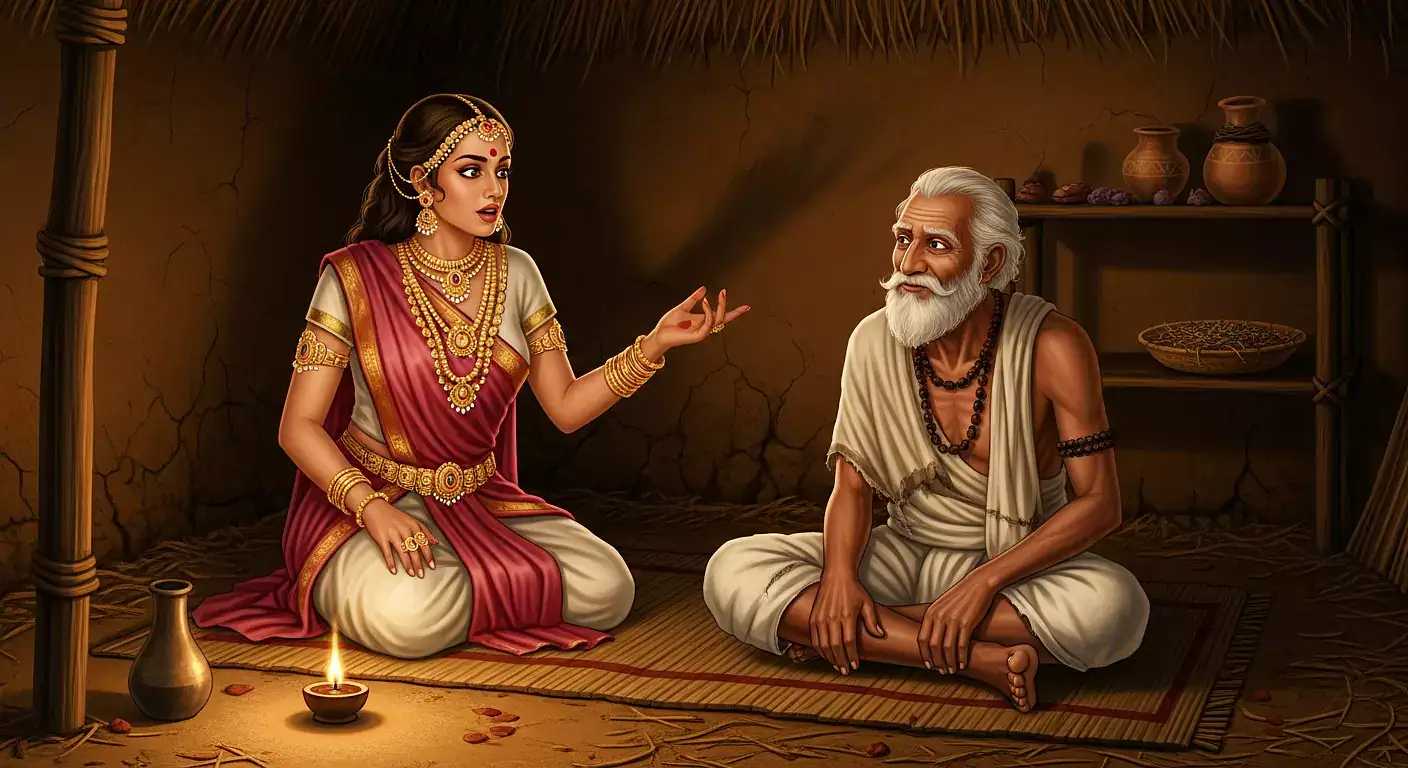
-
Save
“Yes, lady. Hitherto I have been alone; now there are two of us. I will go my rounds and bring home some husked rice. Meanwhile, lie down on this heap of sticks.” And so saying, he gently stroked her with his hand. Causing her to thrill with the divine touch, he laid her down, and at his touch, she lost consciousness. By his supernatural power, he then transported her to the heaven of the Thirty-three and set her down on a heavenly couch in a magnificent palace.
On the seventh day, waking up, she beheld this splendour and knew that this was no brahmin but Sakka himself. At this moment, Sakka was seated at the foot of a coral tree, surrounded by heavenly dancers. Rising from her couch, she approached and saluted the god, standing respectfully on one side.
Then Sakka said, “I give thee a boon: choose what it shall be.”
“Grant me, sire, a son.”
“Not merely one, lady. I will grant you two. One of them shall be wise but ugly, the other handsome but a fool. Which of them will you have first?”
“The wise one,” she answered.
“Good,” said he, and presented her with a piece of kusa grass, a heavenly robe, sandalwood, the flower of the coral tree, and a Kokanada lute. Then he transported her to the king’s bedchamber, laid her down on the same couch with the king, and just touched her person with his thumb. At that moment, the Bodhisatta was conceived in her womb. Sakka straightway returned to his own abode.
The wise queen knew that she had conceived. When the king awoke and saw her, he asked by whom she had been brought there.
“By Sakka, sire.”
“Why! With my own eyes I saw an aged brahmin carry you off. Why do you try to deceive me?”
“Believe me, sire, Sakka took me with him to the angel-world.”
“Lady, I do not believe you.”
Then she showed him the kusa grass that Sakka had given her, saying, “Now believe me.”
The king thought, Kusa grass can be obtained anywhere, and still disbelieved her. Then she showed him her heavenly robes. On seeing these, the king believed her and said, “Dear lady, granted that Sakka carried you off, but are you with child?”
“Yes, sire, I have conceived.”
The king was delighted and performed the ceremonies due to a pregnant woman. In ten months’ time, she gave birth to a son. Giving him no other name, they called him merely after the grass: Kusa.
About the time Prince Kusa could walk alone, a second heavenly being was conceived. They named him Jayampati. The boys were brought up with great state. The Bodhisatta was so wise that, without instruction from a teacher, he attained proficiency in all liberal arts by his own ability.
When he was sixteen years old, the king, anxious to make over the kingdom to him, addressed the queen: “Lady, in making over the kingdom to your son, we would institute dramatic festivities, and in our lifetime, see him established on the throne. If there is any king’s daughter in all India you desire, on his bringing her here, we will make her his queen consort. Sound him as to which king’s daughter he prefers.”
She readily agreed and sent a handmaid to report the matter to the prince and ascertain his views. The maid told him the state of affairs. On hearing her, the Great Being thought, I am not well-favored. A lovely princess, even if brought here as my bride, on seeing me will say, “What have I to do with this ugly fellow?” and will run away, bringing shame. What have I to do with household life? I will foster my parents as long as they live, and at their death, renounce the world and become an ascetic.
So he said, “What need have I of a kingdom or festivities? When my parents die, I will adopt the ascetic life.”
The maid returned and told the queen what he had said. The king was greatly distressed and, after a few days, again sent a message, but he still refused. After thrice rejecting the proposal, on the fourth occasion he thought, It is not fitting to be in complete opposition to one’s parents; I will devise something.
He summoned the chief smith and, giving him a quantity of gold, bade him make a female image. When the smith departed, the prince himself took more gold and fashioned it into the figure of a woman. Verily, the purposes of Buddhas succeed. The figure was beautiful beyond words. The prince had it robed in linen and placed in the royal chamber.
On seeing the image brought by the chief goldsmith, he found fault with it and said, “Go and fetch the figure placed in our royal chamber.” The man went into the room and, on seeing it, thought, This surely must be some heavenly nymph, come to take her pleasure with the prince, and left the room without courage to touch it. He said, “Sire, standing in your royal chamber is a noble daughter of the gods; I dare not approach her.”
“Friend,” the prince said, “go and fetch the golden image.” Charged a second time, he brought it. The prince then ordered the image that the smith had wrought to be thrown into the golden chamber. The figure he himself had made, he adorned and placed in a car, sending it to his mother, saying, “When I find a woman like this, I will take her to wife.”
His mother summoned her councillors and addressed them: “Friends, our son is possessed of great merit and is the gift of Sakka. He must find a princess worthy of him. Place this figure in a covered carriage and traverse the length and breadth of India. Whichever king’s daughter resembles this image, present it to that king, saying, ‘King Okkaka will contract a marriage with your daughter.’ Then arrange a day for your return.”
They agreed and set out with a vast retinue. On their journey, in whatever royal city they came to, at eventide, wherever the people gathered, they decked the image with robes, flowers, and other adornments, mounted it upon a golden car, and left it on the road leading to the ghat. They stepped back and stood aside, listening to what passersby had to say.
The people, seeing it and not realizing it was a golden image, said, “This, though only a woman, is very beautiful, like some divine nymph. Why is she stationed here, and whence does she come? We have no one to compare with her in our city.” After praising her beauty, they went their ways. The councillors said, “If there were any girl like it here, they would say, ‘This is like so-and-so, the king’s daughter,’ or ‘like so-and-so, the minister’s daughter.’ Verily, there is no such maiden here.” And so they continued to the next city.
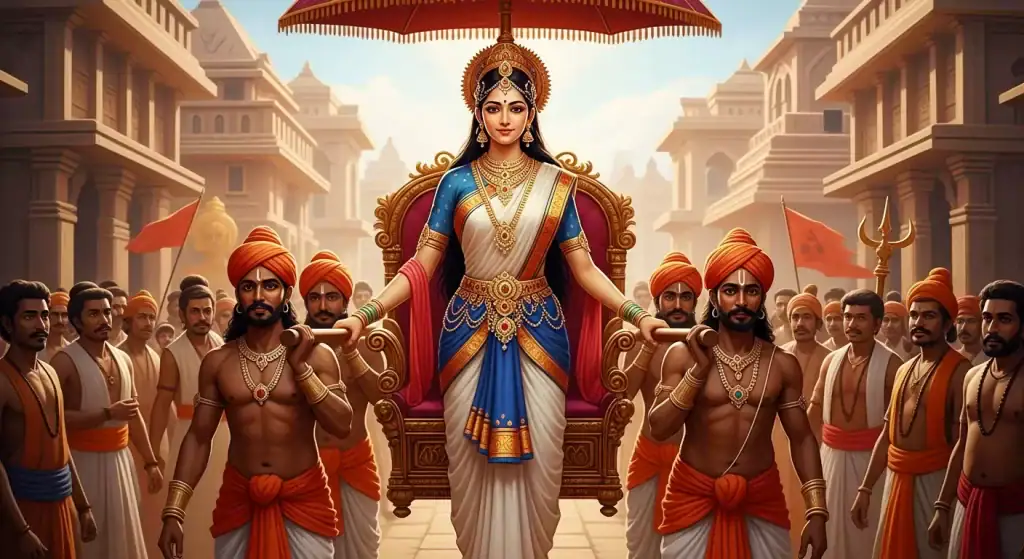
-
Save
In their wanderings, they reached the city of Sagala in the kingdom of Madda. The king of Madda had seven daughters of extraordinary beauty, like nymphs of heaven. The eldest was called Pabhavati. From her person streamed rays of light, like those of the newly-risen sun. When it was dark in her closet, measuring four cubits, no lamp was needed—the whole chamber was ablaze with light.
Pabhavati had a humpbacked nurse who, after feeding her and intending to wash her head, went at eventide with eight slave-girls carrying waterpots to fetch water from the ghat. On the way, she caught sight of the golden image and, thinking it was Pabhavati, exclaimed, “The ill-behaved girl, pretending she would have her head washed, sent us to fetch water and, stealing a march upon us, is standing here in the road!” In a rage, she cried, “Fie! You are a disgrace to the family. Should the king hear of it, he will be the death of us!” With these words, she struck the image on the cheek, breaking a space as big as the palm of her hand.
Then, discovering it was a golden image, she burst out laughing and said to the slave-girls, “See what I have done! Thinking it was my foster daughter, I struck it. What is this image worth in comparison with my child? I have only hurt my hand for my pains.”
The king’s emissaries took hold of her and asked, “What story is this you tell us, saying that your daughter is fairer than this image?”
“I mean Pabhavati, the Madda king’s daughter. This image is not worth a sixteenth fraction of her,” she replied.
Glad at heart, the emissaries sought the entrance to the palace and had themselves announced to the king, sending word that King Okkaka’s emissaries were at his door. The king arose and ordered them to be admitted. On entering, they saluted him: “Sire, our king inquires after your health.” Receiving a hospitable welcome, they explained, “Our king has a son, the bold Prince Kusa. He is to inherit the kingdom, and has sent us to request your daughter Pabhavati in marriage, presenting this golden figure as a gift.”
The king gladly agreed, thinking an alliance with such a noble king would be auspicious. The envoys then said, “Sire, we cannot tarry here. We will go and tell our king that we have secured the princess, and he will come to fetch her.” The king consented, entertained them hospitably, and let them go.
On their return, they reported to King Okkaka and Queen Silavati. The king, with a great retinue, set out from Kusavati and eventually reached Sagala. The Madda king met him, brought him into the city, and paid him great honor. Queen Silavati, wise as she was, thought, “What will be the outcome of all this?” After one or two days, she said to the king, “We are anxious to see our daughter-in-law.” He readily agreed and sent for her.
Pabhavati, magnificently dressed and surrounded by attendants, came and saluted her mother-in-law. Seeing her, the queen thought, “This maiden is very lovely, and my son is ill-favored. Should she see him, she will not stay a single day but will run away. I must devise a scheme.” Addressing the Madda king, she said, “My daughter-in-law is worthy of my son; however, we have an hereditary custom. If she will abide by it, we will take her as his bride.”
“What is this custom?” asked the king.
“In our family, a wife may not see her husband by daylight until she has conceived. If she abides by this, we will consent.”
The king asked his daughter, “My dear, can you abide by this?”
“Yes, dear father,” she replied.
King Okkaka bestowed gifts on the Madda king and departed with Pabhavati. The Madda king sent his daughter with a vast retinue. On reaching Kusavati, Okkaka ordered the city decorated, released all prisoners, and, after crowning his son king and establishing Pabhavati as his chief consort, proclaimed King Kusa’s rule by beat of drum.
All kings throughout India who had daughters sent them to Kusa’s court, and those with sons sent them to be his pages. The Bodhisatta had a large company of dancers and ruled with great state. By day, he was not allowed to see Pabhavati, nor she him, but at night they had free access to each other. At that time, extraordinary effulgence shone from Pabhavati, yet the Bodhisatta left the royal chamber while it was still dark.
After a few days, he told his mother he longed to see Pabhavati by day. She refused, saying, “Let not this be thy pleasure; wait until she has conceived.” Again and again he besought her. Finally, she said, “Well, go to the elephant-stall, disguised as an elephant-keeper. I will bring her there, so you may gaze at her, but see that you do not reveal yourself.”
He agreed and went to the elephant-stall. The queen proclaimed an elephant festival and said to Pabhavati, “Come, we will see your lord’s elephants.” She took her there, pointing out each elephant by name. As Pabhavati walked behind her mother, the disguised prince struck her back with a lump of elephant dung. Enraged, she exclaimed, “I will have the king cut your hand off!” Her mother appeased her by rubbing her back.
A second time, the prince, disguised as a groom in the horse-stable, struck her with a piece of horse-dirt. Again, Pabhavati was angry, but her mother appeased her.
Once more, Pabhavati begged her mother to allow her to see the Great Being. When refused, she besought her repeatedly, until at last Silavati said, “Tomorrow, my son will make a solemn procession through the city. You may open your window and see him.”
The next day, the city was decked out, and Prince Jayampati, clad in a royal robe and mounted on an elephant, made a triumphal procession. Standing at the window with Pabhavati, the queen said, “Behold the glory of your lord.” Pabhavati exclaimed, “I have found a husband not unworthy of me,” and was highly elated.
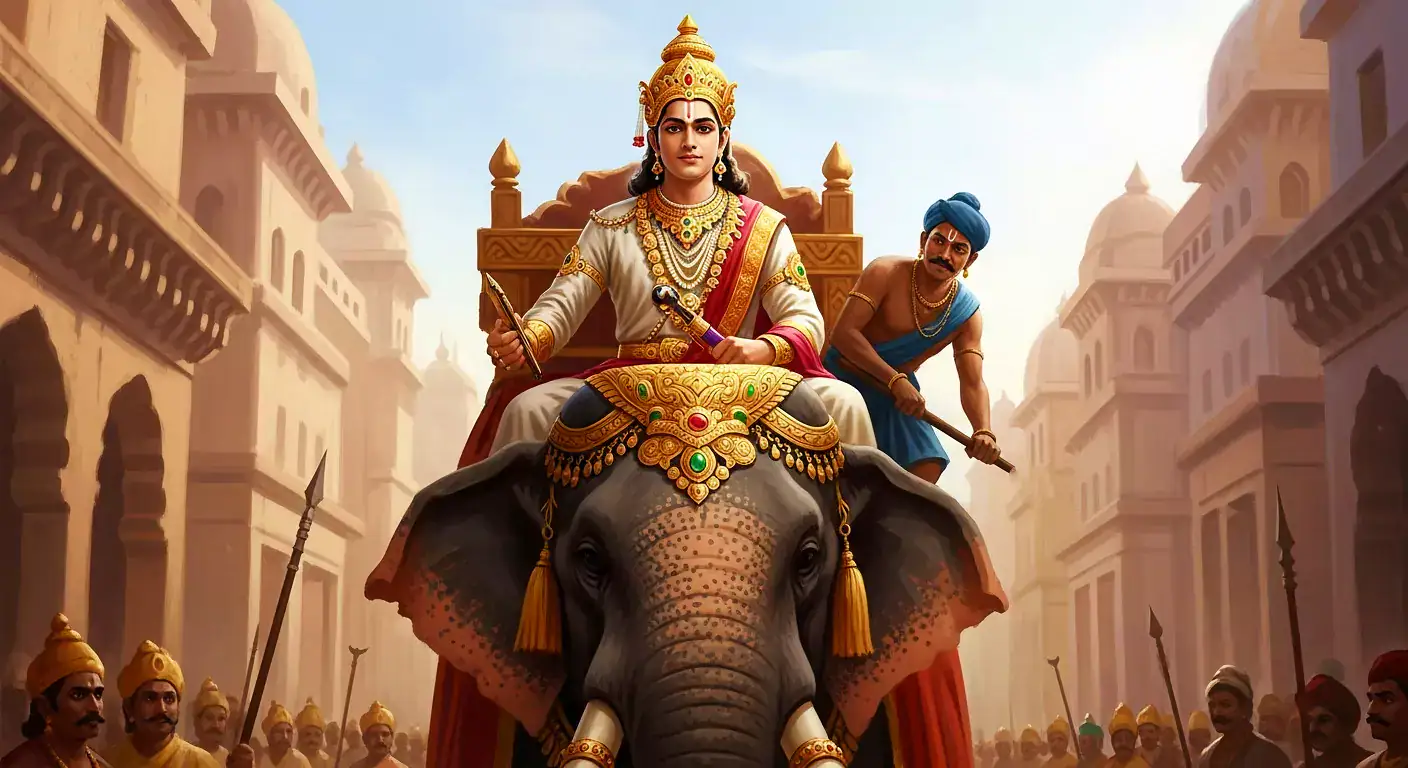
-
Save
But that very day, the Great Being, disguised as an elephant-keeper, was seated behind Jayampati, and, gazing at Pabhavati as he wished, he disported himself with gestures of joy, moving his hands playfully. When the elephant had passed, the queen-mother asked her if she had seen her husband.
“Yes, lady, but seated behind him was an elephant-keeper, a very ill-conducted fellow, who gesticulated at me with his hands. Why do they let such an ugly, ill-omened creature sit behind the king?”
“It is desirable, my dear, to have a guard sit behind the king,” said the queen.
“This elephant-keeper,” Pabhavati thought, “is bold and shows no proper respect for the king. Could he be King Kusa? No doubt he is hideous, and that is why they do not let me see him.”
She whispered to her humpbacked nurse, “Go at once and find out whether it was the king who sat in front or behind.”
“How am I to know?” asked the nurse.
“If he is the king, he will be the first to alight from the elephant. Mark this, and you shall know.”
The nurse went and stood at a distance, observing the procession. She saw the Great Being alight first, followed by Prince Jayampati. Noticing the old woman, the Great Being immediately understood her purpose, summoned her, and charged her strictly not to reveal his secret, then let her go. She returned and told her mistress, “The one who sat in front alighted first,” and Pabhavati believed her.
Once more, the king longed to see her and begged his mother to arrange it. She could not refuse him and said, “Well then, disguise yourself and go to the garden.”
He went and hid himself up to his neck in the lotus-pool, standing in the water with his head shaded by a lotus leaf and his face covered by its flower. In the evening, his mother brought Pabhavati to the garden, saying, “Look at these trees, or watch these birds and deer,” leading her toward the lotus pond. When she saw the pond covered with five kinds of lotus, she longed to bathe and went down to the water’s edge with her maidens.
While disporting herself, she stretched forth her hand to pluck a lotus. The king, putting aside the lotus leaf, took her hand and said, “I am King Kusa.”
On seeing his face, she cried, “A goblin is catching me!” and swooned. The king let go her hand. Upon regaining consciousness, she thought, “King Kusa, they say, caught me by the hand, and he it was who struck me in the elephant-stall with elephant-dung, in the horse-stable with horse-dirt, and sat behind me on the elephant making sport of me. What have I to do with such an ugly, hideous husband? If I live, I will have another husband.”
She summoned the councillors who had escorted her and said, “Make ready my chariot. Today I will depart.”
They informed the king, who thought, “If she cannot escape, her heart will break; let her go. By my power, I will bring her back.” So he allowed her to depart, and she returned straight to her father’s city. The Great Being returned to his palace from the garden.
Verily, it was due to an aspiration in a previous existence that she disapproved of the Bodhisatta, and owing to a past act of his, he was so ugly. Of old, in a suburb of Benares, one family had two sons and another a daughter. The Bodhisatta, the younger son, lived with his elder brother, who had married the maiden.
One day, in this house, they baked dainty cakes. The Bodhisatta was away in the forest, so his portion was set aside. His sister-in-law gave his cake to a paccekabuddha, and at that very moment, he returned. “My lord, do not be angry, but I have given your portion to this holy man,” she said.
He replied, “After eating your own portion, you give mine away. You shall make me another cake!” Angry, he took the cake from the beggar’s bowl. The sister-in-law brought fresh ghee, melted and golden like the champac flower, filling the bowl, which sent forth a blaze of light. She prayed, “Holy sir, wherever I am born, may my body shine with light, may I be very lovely, and never again dwell with this lewd fellow.”
The Bodhisatta, as he replaced the cake in the bowl, prayed, “Holy sir, though she should live a hundred leagues away, may I have the power to carry her off as my bride.” In anger, he took the cake, and as the result of that past act, he was born so ugly.
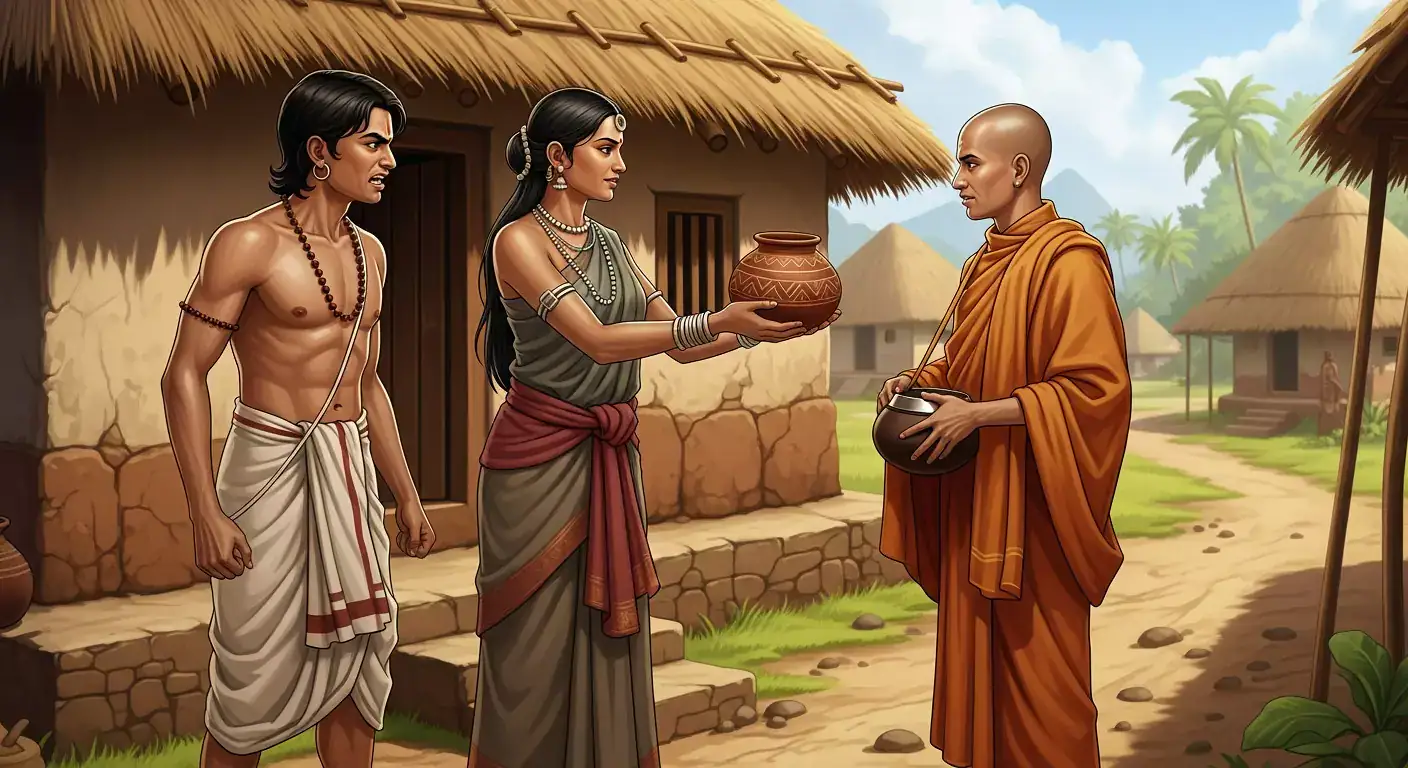
-
Save
Kusa was overwhelmed with sorrow when Pabhavati left him. The other women, though ministering to him in every way, dared not look him in the face, and the palace, bereft of Pabhavati, seemed desolate. He thought, “By this time she will have reached the city of Sagala.” At break of day, he sought his mother and said, “Dear mother, I will go and fetch Pabhavati. You are to rule my kingdom,” and he uttered the first stanza:
This realm with joy and bliss untold,
Trappings of state and wealth of gold,
This realm, I say, rule thou for me:
I go to seek Pabhavati.
His mother replied, “Well, my son, you must exercise great vigilance: women, verily, are impure-minded creatures.” She filled a golden bowl with dainty food, saying, “This is for you to eat on the journey,” and took leave of him. Taking the bowl and thrice saluting his mother, he cried, “If I live, I will see you again,” and withdrew to the royal chamber.
He girded himself with five sorts of weapons, placed a thousand pieces of money in a bag, took the bowl of food and a Kokanada lute, and left the city to set out on his journey. Being strong and vigorous, by noon he had travelled fifty leagues, eaten his food, and in the remaining half-day completed another fifty leagues. In a single day, he accomplished a journey of one hundred leagues.
In the evening, he bathed and entered the city of Sagala. No sooner had he set foot in the city than, by the power of his virtue, Pabhavati could no longer rest quietly on her couch; she rose and lay upon the ground. Exhausted from his journey, he was seen wandering the street by a woman who invited him to rest in her house. After bathing his feet, she offered him a bed. While he slept, she prepared food, which he ate upon waking. Pleased with her hospitality, he presented her with the thousand pieces of money and the golden bowl, leaving his five sorts of weapons behind.
He said, “There is some place I must go,” took his lute, and repaired to the elephant-stall, saying to the elephant-keepers, “Let me stay here and I will make music for you.” They allowed it, and he lay down apart. When his fatigue passed, he rose, unstrapped his lute, and played and sang, thinking that all in the city should hear it. Pabhavati, lying on the ground, heard the music and thought, “This sound can come from no lute but his,” and knew that King Kusa had come on her account.
The king of Madda, hearing it, thought, “He plays very sweetly. Tomorrow I will send for him and make him my minstrel.” The Bodhisatta, realizing that he could not see Pabhavati while staying there, left and, after taking his morning meal in an eating-house, became an apprentice to the king’s potter.
One day, after filling the house with clay, he asked if he should make some vessels. When the potter agreed, he placed a lump of clay on the wheel and turned it. Once turned, the wheel spun swiftly until mid-day. After moulding all manner of vessels, great and small, he began making one especially for Pabhavati, decorating it with various figures. Verily, the purposes of Buddhas succeed—he resolved that only Pabhavati should see these figures.
When the vessels were dried and baked, the house was full of them. The potter took samples to the palace. The king, seeing them, asked who had made them.
“I did, sire,” said the potter.
“I am sure you did not. Who did?”
“My apprentice, sire,” replied the potter.
“Not your apprentice, but your master. Learn from him; henceforth let him make vessels for my daughters.” He gave the potter a thousand pieces of money, saying, “Give him this, and present all these small vessels to my daughters.”
The potter delivered the vessels to the palace. When he gave Pabhavati the vessel that Kusa had made especially for her, she immediately recognized her likeness and that of her humpbacked nurse, realizing it could be no one’s handiwork but King Kusa’s. Angrily, she said, “I do not want it; give it to those who wish for it.” Her sisters, seeing her rage, laughed and said, “You suppose it is the work of King Kusa? It was the potter, not he, who made it. Take it.” She did not reveal that Kusa had made it.
The potter then gave the thousand pieces of money to the Bodhisatta, saying, “My son, the king is pleased with you. Henceforth, you are to make vessels for his daughters, and I will deliver them.” Kusa, realizing it was impossible to see Pabhavati there, returned the money and went to a basket-maker who served the king, becoming his apprentice. He made a palm-leaf fan for Pabhavati, depicting a white umbrella as a symbol of royalty and representing a banquet hall, including a standing figure of Pabhavati. The basket-maker delivered this and other wares, all the workmanship of Kusa, to the palace.
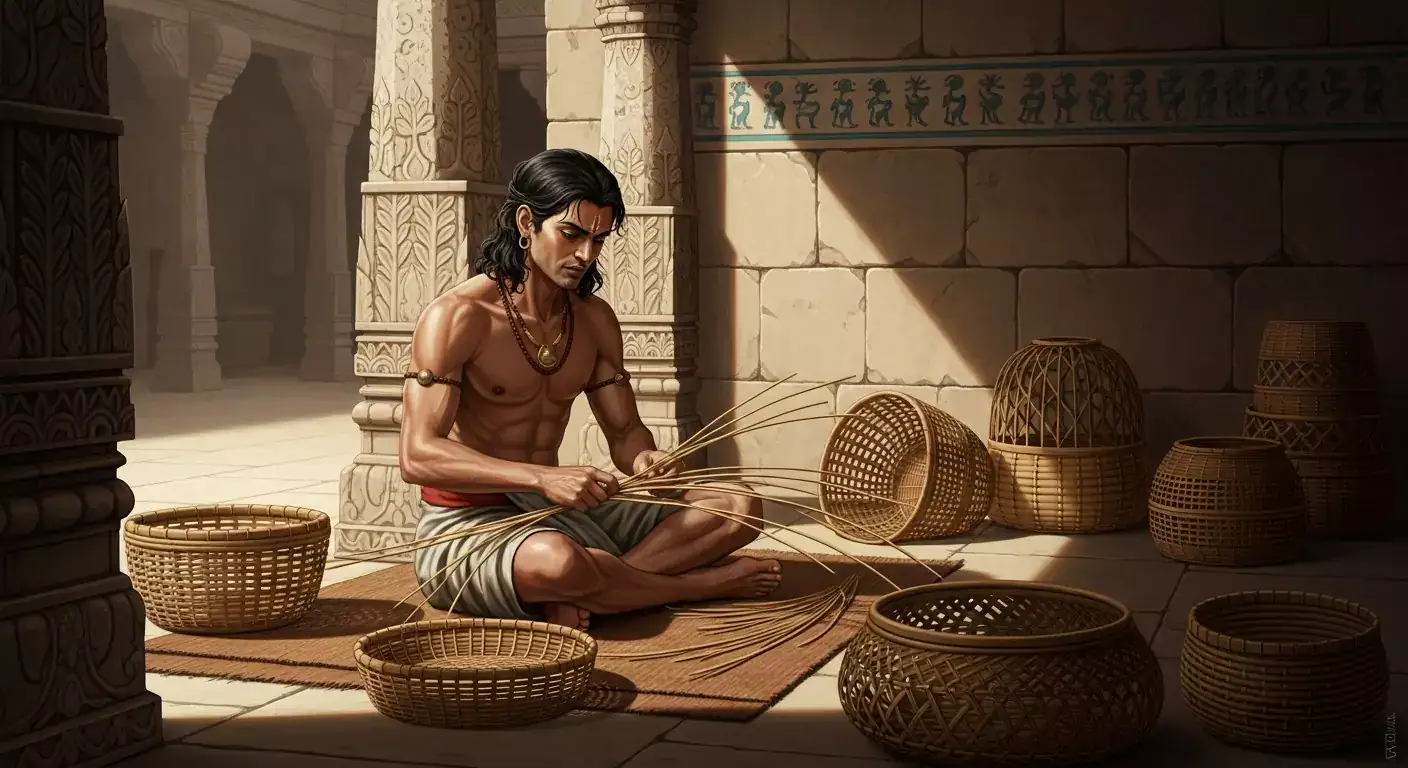
-
Save
The king, seeing the wickerwork and the fan, asked who had made them and, as before, presented a thousand pieces of money to the artisan, saying, “Give these specimens of workmanship to my daughters.” He gave the fan specially made for Pabhavati to her. As before, no one recognized the figures, but Pabhavati, seeing them, knew they were the king’s handiwork. Angrily, she said, “Let those who wish for it take it,” and threw it on the ground. Her sisters laughed at her.
The basket-maker brought the money and gave it to the Bodhisatta. Thinking that this was no place for him to stay, he returned the money and went to the king’s gardener, becoming his apprentice. While making all sorts of garlands, he crafted a special wreath for Pabhavati, adorned with various figures. The gardener took the wreath to the palace. The king asked who had fashioned these garlands.
“I did, sire,” said the gardener.
“I am sure you did not. Who did?”
“My apprentice, sire,” replied the gardener.
“He is not your apprentice, but your master. Learn your trade from him. Henceforth, he shall weave garlands for my daughters. Take this thousand pieces of money, and deliver these flowers to my daughters.”
The gardener offered the special wreath to Pabhavati. Again, seeing the likenesses of herself and the king among the figures, she recognized Kusa’s handiwork and, in her rage, threw it on the ground. Her sisters laughed at her once more. The gardener gave the thousand pieces of money to the Bodhisatta, recounting what had happened. Kusa thought, “This too is no place for me,” returned the money, and engaged himself as an apprentice to the king’s cook.
One day, while the cook was taking various victuals to the king, he gave Kusa a bone of meat to cook for himself. Kusa prepared it so skillfully that its aroma pervaded the entire city. The king, noticing the smell, asked if more meat was being cooked in the kitchen.
“No, sire, but I did give my apprentice a bone to cook; it must be that,” the cook replied.
The king had it brought and placed a morsel on the tip of his tongue. Its flavor thrilled all seven thousand nerves of taste. Enchanted by the delight, the king gave Kusa a thousand pieces of money and said, “Henceforth, you are to prepare food for me and my daughters. Bring mine to me yourself, and your apprentice shall deliver theirs to my daughters.”
The cook informed Kusa, who thought, “Now my desire is fulfilled: now I shall be able to see Pabhavati.” Pleased, he returned the thousand pieces of money to the cook and, the next day, prepared and sent dishes to the king. He then climbed to the palace where Pabhavati dwelt, carrying the food for the king’s daughters on a pole.
Seeing him, Pabhavati thought, “He is performing the work of slaves and hirelings, work unworthy of him. If I remain silent, he will think I approve and stay here, gazing at me. I must abuse and revile him, and drive him away at once.”
She left the door half open, one hand on the panel and the other pressing the bolt, and recited the second stanza:
Kusa, for thee by day and night
To bear this burden is not right.
Haste back, pray, to Kusavati;
Thy ugly form I’m loth to see.
Kusa thought, “I have heard Pabhavati speak,” and, pleased at heart, recited three stanzas in reply:
Bound by thy beauty’s spell, Pabhavati,
My native land has little charm for me;
Madda’s fair realm is ever my delight,
My crown resigned, to live in thy dear sight.
O soft-eyed maiden, fair Pabhavati,
What is this madness that o’ermasters me?
Knowing full well the land that gave me birth,
I wander half distraught o’er all the earth.
Clad in bright-coloured bark and girt with golden zone,
Thy love, fair maid, I crave, and not an earthly throne.
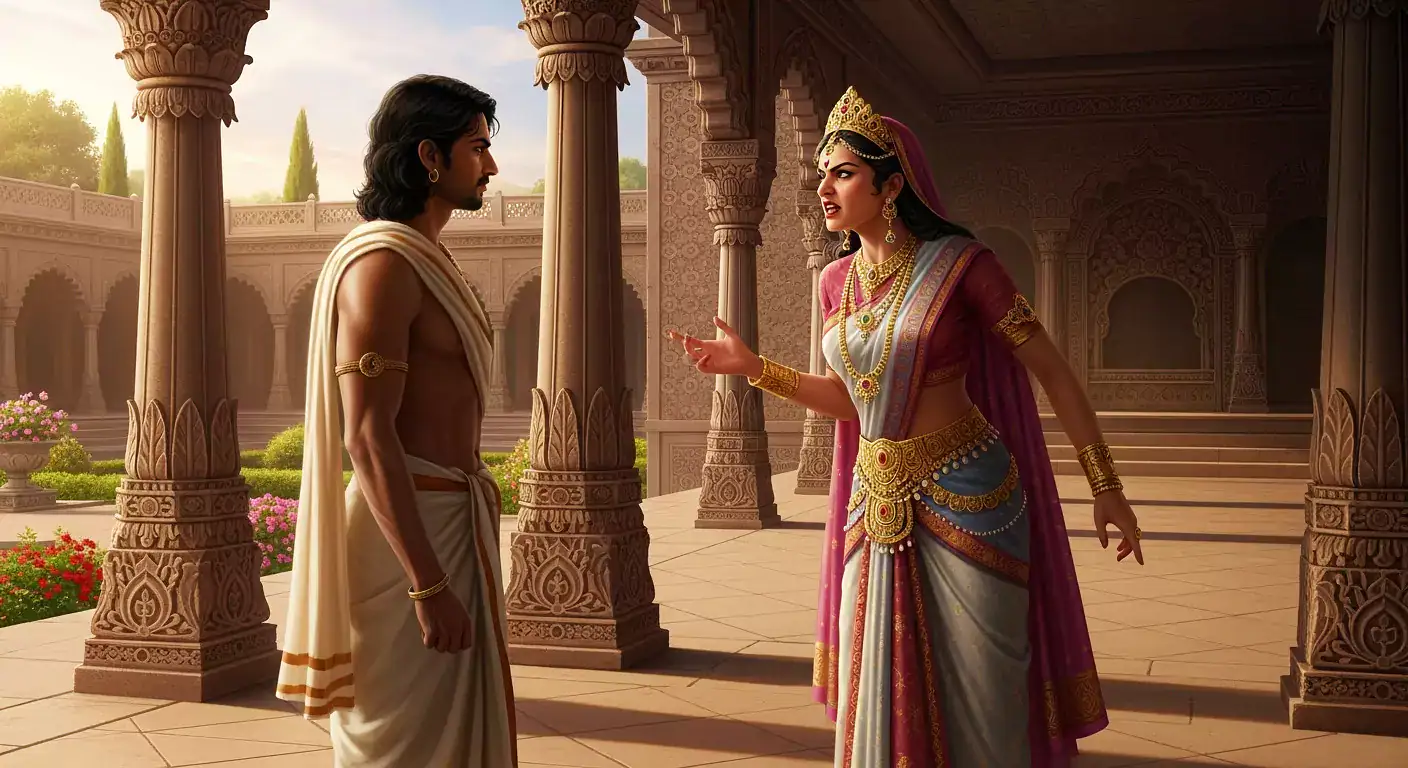
-
Save
When he had thus spoken, she thought, “I revile him, hoping to rouse resentment, yet he seems to conciliate me with his words. Suppose he were to say, ‘I am King Kusa,’ and take me by the hand—who could prevent it? And someone might overhear our conversation.” So she closed the door and bolted it inside.
Kusa took up his carrying-pole and delivered food to the other princesses. Pabhavati sent her humpbacked slave to fetch the portion he had cooked for her. The slave brought it and said, “Now eat.”
Pabhavati replied, “I will not eat what he has cooked. You eat it yourself, fetch and cook your own food, and bring it here—but do not tell anyone that King Kusa has come.” From that time, the humpback brought and ate the princess’s portion while giving her own portion to Pabhavati.
Unable to see her directly, Kusa thought, “I wonder whether Pabhavati has any affection for me. I must put her to the test.” After supplying the princesses with their food, he took his load of victuals, went to her door, struck the floor with his feet, clashed the dishes together, groaned aloud, and fell in a heap, swooning.
At the sound, Pabhavati opened her door. Seeing him crushed beneath his load, she thought, “Here is a king, the chief ruler of all India, and for my sake he suffers pain day and night. Now, being so delicately nurtured, he has fallen under the burden of the victuals he carries. I wonder if he is still alive.” She stepped from her chamber and stretched her neck to watch his breathing. He filled his mouth with spittle and let it drop on her person. She retired, reviling him, and standing with the door half open, recited the stanza:
Ill luck is his that ever craves, to find his wishes spurned,
As thou, O king, dost fondly woo with love still unreturned.
But, madly in love with her, he showed no resentment and replied:
Whoso shall gain what he holds dear, may loved or unloved be,
Success alone is what we praise, to lose is misery.
She spoke again, firmly, as if to drive him away:
As well to dig through bed of rock with brittle wood as spade,
Or catch the wind within a net, as woo unwilling maid.
Kusa answered with three stanzas:
Hard-hearted as a stone art thou, so soft to outward view,
No word of welcome though I’ve come from far thy love to sue.
When thou dost frown regarding me, proud dame, with sullen look,
Then I in royal Madda’s halls am nothing but a cook.
But if, O queen, in pity thou shouldst deign to smile on me,
No longer cook, once more am I lord of Kusavati.
She thought, “He is very pertinacious. I must devise a lie to drive him hence,” and recited:
If fortune tellers spoke true words, ’twas this in sooth they said,
“Mayst thou in pieces seven be hewn, ere thou King Kusa wed.”
Kusa contradicted her: “Lady, I too consulted fortune tellers in my kingdom, and they predicted no other husband for you save the lion-voiced lord, King Kusa. Through omens I declare the same,” and recited:
If I and other prophets here have uttered a true word,
Save me King Kusa, thou shalt hail none other as thy lord.
She thought, “One cannot shame him. What is it to me whether he departs?” and shut the door. Kusa took up his load and went down. From that day, he could not see her and grew weary of his cook’s work. After breakfast, he cut firewood, washed dishes, fetched water on his carrying-pole, and rested on a heap of grain. Rising early, he cooked rice gruel and other food, serving it diligently, all out of his passionate love for Pabhavati.
One day he saw the humpback passing the kitchen door and called to her. Fearing Pabhavati, she pretended to be in a great hurry and passed by. Kusa ran after her, crying, “Crook-back!” She stopped. “Who is here? I cannot listen to you,” she said.
He replied, “Both you and your mistress are obstinate. Though living near you, we cannot even get a report of her health.”
She asked, “Will you give me a present?”
He said, “If I do, will you soften Pabhavati and bring me into her presence?” On her agreeing, he tempted her further: “If you succeed, I will correct your humpback and give you an ornament for your neck,” reciting five stanzas:
Necklace of gold I’ll give to thee,
On coming to Kusavati,
If slender-limbed Pabhavati
Should only deign to look on me.
Necklace of gold I’ll give to thee,
On coming to Kusavati,
If slender-limbed Pabhavati
Should only deign to speak to me.
Necklace of gold I’ll give to thee,
On coming to Kusavati,
If slender-limbed Pabhavati
Should only deign to smile on me.
Necklace of gold I’ll give to thee,
On coming to Kusavati,
If slender-limbed Pabhavati
Should laugh with joy at sight of me.
Necklace of gold I’ll give to thee,
On coming to Kusavati,
If slender-limbed Pabhavati
Should lay a loving hand on me.
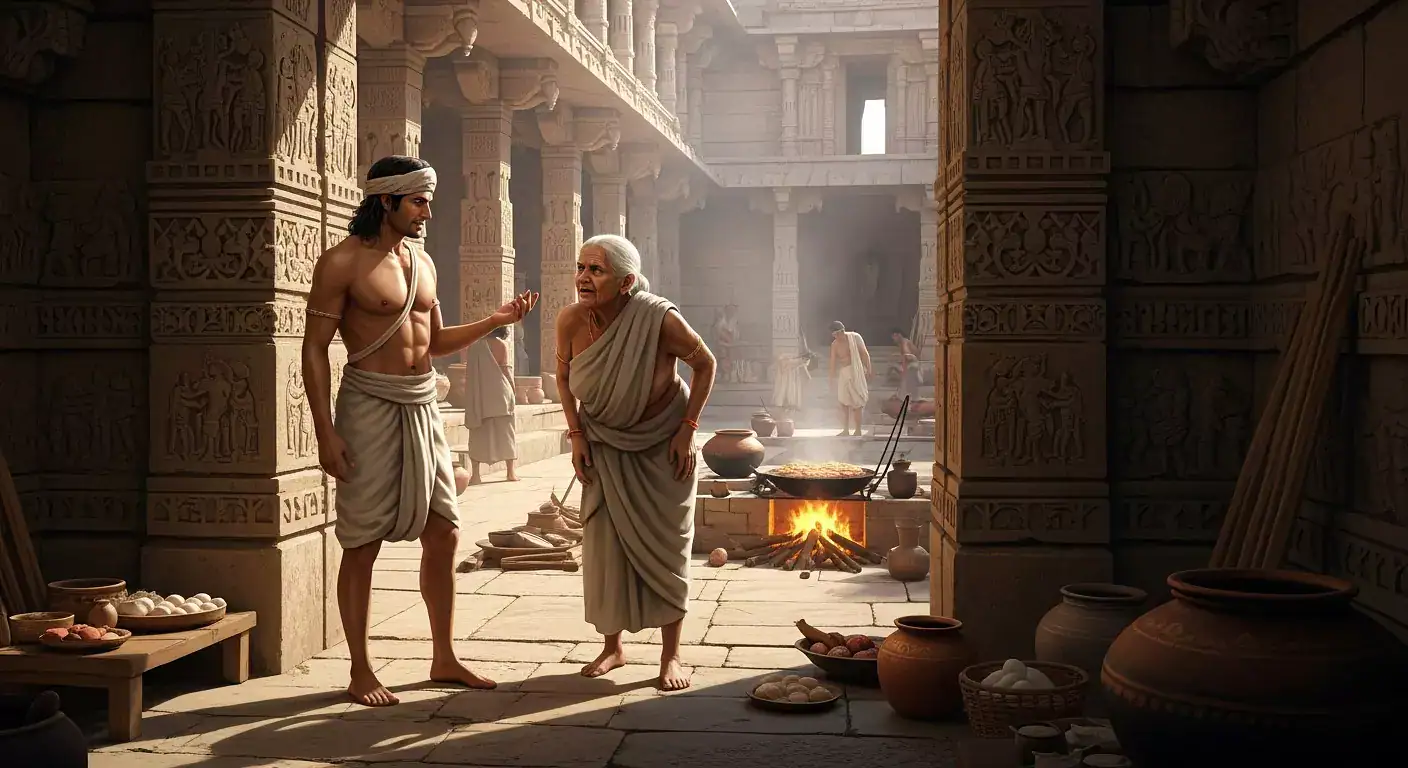
-
Save
On hearing his words, she said, “Get you gone, my lord: in a very few days I will put her in your power. You shall see how energetic I can be.” So saying, she decided on her course of action and went to Pabhavati. She acted as if she would clean the room, leaving not a speck of dust, and even removed her shoes, sweeping the entire chamber spotless. Then she arranged a high seat for herself in the doorway (keeping well outside the threshold) and, spreading a coverlet on a low stool for Pabhavati, said, “Come, my dear, and I will search your head for vermin.”
Making Pabhavati sit and rest her head upon her lap, she scratched it lightly and said, “Ho! What a lot of lice we have here,” then took some from her own head and placed them on the princess’s, speaking endearingly of the Great Being and praising him in this stanza:
This royal dame no pleasure feels Kusa once more to see,
Though, wanting nought, he serves as cook for simple hireling’s fee.
Pabhavati was enraged with the humpback. The old woman then took her by the neck, pushed her inside the room, and, standing outside, closed the door and clung to the cord that pulled it shut. Pabhavati, unable to reach her, stood by the door, abusing her, and recited another stanza:
This humpbacked slave, without a doubt,
For speaking such a word,
Deserves to have her tongue cut out
With keenest sharpened sword.
The humpback stood holding the rope and said, “You worthless, ill-behaved creature, what good will your fair looks do anyone? Can we live by feeding on your beauty?” Then, shouting the virtues of the Bodhisatta in her harsh voice, she proclaimed thirteen stanzas:
Esteem him not, Pabhavati, by outward form or height,
Great glory his, so do whate’er is pleasing in his sight.
Esteem him not, Pabhavati, by outward form or height,
Great wealth is his, so do whate’er is pleasing in his sight.
Esteem him not, Pabhavati, by outward form or height,
Great power is his, so do whate’er is pleasing in his sight.
Esteem him not, Pabhavati, by outward form or height,
Wide rule is his, so do whate’er is pleasing in his sight.
Esteem him not, Pabhavati, by outward form or height,
Great king is he, so do whate’er is pleasing in his sight.
Esteem him not, Pabhavati, by outward form or height,
Lion-voiced is he, so do whate’er is pleasing in his sight.
Esteem him not, Pabhavati, by outward form or height,
Clear-voiced is he, so do whate’er is pleasing in his sight.
Esteem him not, Pabhavati, by outward form or height,
Deep-voiced is he, so do whate’er is pleasing in his sight.
Esteem him not, Pabhavati, by outward form or height,
Sweet-voiced is he, so do whate’er is pleasing in his sight.
Esteem him not, Pabhavati, by outward form or height,
Honey-voiced is he, so do whate’er is pleasing in his sight.
Esteem him not, Pabhavati, by outward form or height,
A hundred arts are his, so do what’s pleasing in his sight.
Esteem him not, Pabhavati, by outward form or height,
A warrior king is he, so do what’s pleasing in his sight.
Esteem him not, Pabhavati, by outward form or height,
King Kusa ’tis, so do whate’er is pleasing in his sight.
Hearing this, Pabhavati threatened the humpback, saying, “Crook-back, you roar too loud. If I catch hold of you, you shall learn the power of a mistress.” The humpback replied, “In consideration of you, I did not let your father know of King Kusa’s arrival. Well, today I will tell him,” speaking loudly to cow her. Fearing someone might overhear, Pabhavati pacified her.
Unable to see Pabhavati for seven months, Kusa grew weary of his harsh bed and poor food and thought, “What need have I of her? After seven months, I cannot even see her. She is harsh and cruel. I will go see my father and mother.”
At that moment, Sakka, considering the matter, saw Kusa’s discontent and thought, “After seven months he is unable even to see Pabhavati. I will find a way for him to see her.” He sent messengers to seven kings, pretending they came from King Madda, saying, “Pabhavati has rejected King Kusa and returned home. You are to come and take her as your wife.” He sent the same message to each king separately.
All seven arrived in the city with great retinues, unaware of each other’s intentions. They asked, “Why have you come here?” Upon learning the truth, they grew angry. “Will he give his daughter in marriage to seven of us? See how ill he behaves. He mocks us, saying, ‘Take her to wife.’ Let him either give Pabhavati to all seven or fight us.” They sent a message to Kusa and invested the city.
On hearing this, King Madda was alarmed and consulted his ministers: “What are we to do?”
The ministers replied, “Sire, these seven kings have come for Pabhavati. If you refuse, they will break the walls, destroy us, and seize your kingdom. While the walls still stand, let us send Pabhavati to them,” and recited the stanza:
Like to proud elephants they stand in coats of mail arrayed,
Ere yet they trample down our walls, send off in haste the maid.
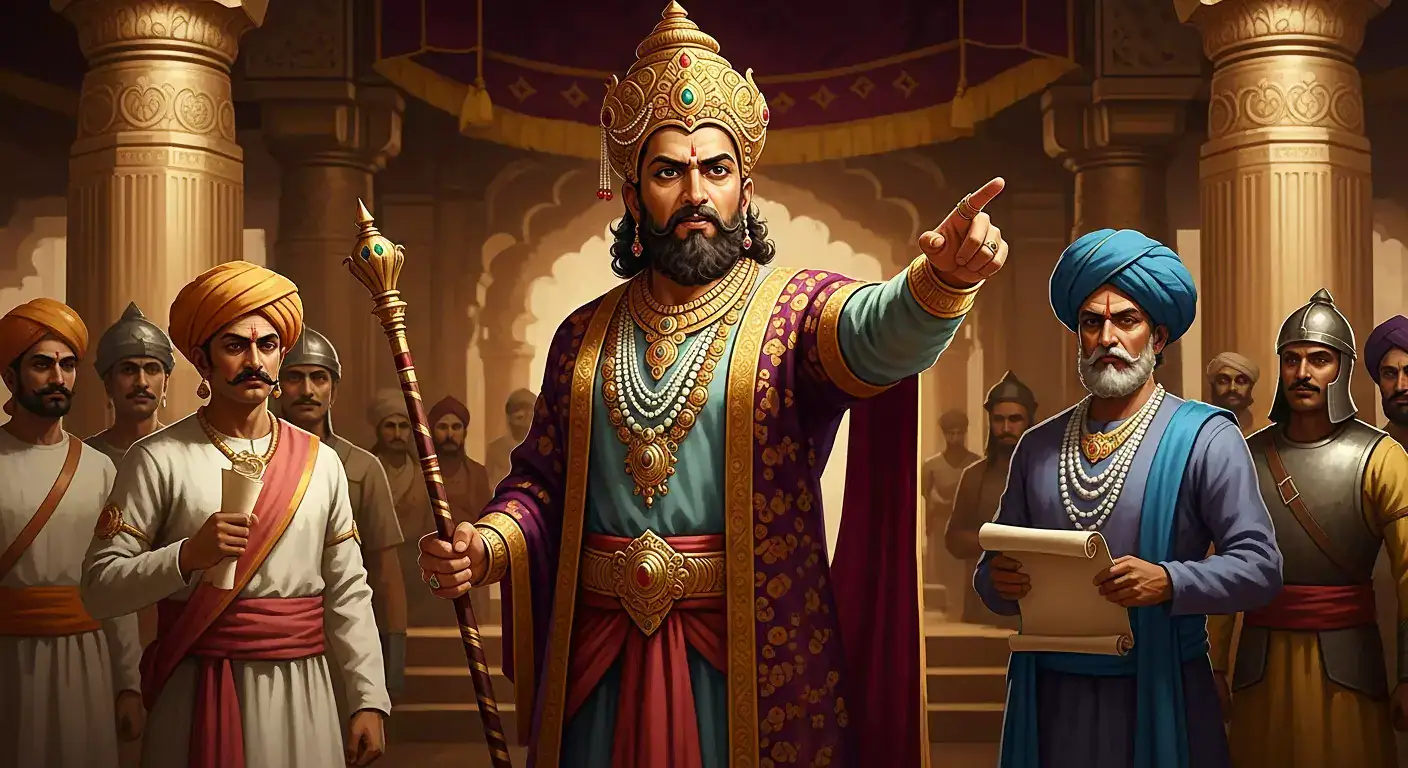
-
Save
The king, on hearing this, said, “If I should send Pabhavati to any one of them, the rest will join battle with me. It is out of the question to give her to any one of them. After casting off the chief king in all India, let her receive the reward due to her return home. I will slay her and, cutting her body into seven pieces, send one to each of the seven kings,” and so saying, he recited a stanza:
In pieces seven Pabhavati to hack, it is my will,
One piece for each of these seven kings, who came her sire to kill.
This decree spread throughout the palace. Her attendants came to Pabhavati and said, “The king, they say, will cut you in seven pieces and send them to the seven kings.” Terrified, she rose from her seat and, accompanied by her sisters, went to her mother’s state chamber.
The Master, to make the matter clear, said:
Comely though swart of hue uprose the queen and moved before
Her train of handmaids, clad in silk attire and weeping sore.
She came before her mother, saluted her, and lamented:
This face with powder beautified, here mirrored in a glass
To ivory handle deftly fixed, so winsome now alas!
With innocence and purity in every line expressed,
By warrior princes spurned in some lone forest soon will rest.
These locks of hair so black of hue, bound up in stately coil,
Soft to the touch and fragrant with the finest sandal oil,
In charnel ground though covered up the vultures soon will find
And with their talons rend and tear and scatter to the wind.
These arms whose fingertips are dyed, like copper, crimson red,
In richest sandal oil oft bathed and with soft down o’erspread,
Cut off and by proud kings in some lone forest flung aside,
A wolf will seize and carry off where’er he’s fain to hide.
My teats are like the dates that on the palms with ripeness swell,
Fragrant with scent of sandalwood that men of Kasi fell:
Hanging thereon a jackal soon at them, methinks, will tug,
Just as a little baby boy his mother’s breast may hug.
These hips of mine, well-knit and broad, cast in an ample mould,
Encircled with a cincture gay, wrought of the purest gold,
Cut off and by proud kings in some lone forest flung aside,
A wolf will seize and carry off where’er he’s fain to hide.
Dogs, wolves, jackals and whatsoe’er are known as beasts of prey,
If once they eat Pabhavati, can suffer no decay.
Should warrior kings that come from far thy daughter’s body flay,
Begging my bones, burn them with fire in some sequestered way.
Then make a garden near and plant a kanikara tree,
And when at winter’s close it blooms, mother, recalling me,
Point to the flower and say, “Just such was dear Pabhavati.”
Thus, alarmed by the fear of death, she lamented before her mother. The Madda king issued an order for the executioner to bring his axe and block. News of his arrival spread throughout the palace. The queen-mother, hearing this, arose from her throne, overwhelmed with sorrow, and went into the king’s presence.
The Master said:
Seeing the sword and block set out within the fatal ring,
All goddess-like the royal dame rose up and sought the king.
Then the queen spoke:
With this sword will the Madda king his graceful daughter slay,
And piecemeal send her mangled limbs to rival chiefs a prey.
The king tried to pacify her: “Lady, what is this you say? Your daughter rejected the chief king of all India on the plea of his ugliness, and, accepting death as her fate, returned home before the prints of her feet were well wiped from the road. Now therefore let her reap the consequences of the jealousy excited by her beauty.”
The queen, after hearing him, went to her daughter and lamented:
Thou didst not hearken to my voice, when counselling thy good,
To-day thou sink’st to Yama’s realm, thy body stained with blood.
Such fate doth every man incur, or even a worse end,
Who deaf to good advice neglects the warnings of a friend.
If thou to-day a gallant prince for thy good lord shouldst wed,
Bedight with zone of gold and gems, in land of Kusa bred,
Thou wouldst not, served with hosts of friends, to Yama’s realms have sped.
When drums are beat and elephants’ loud trumpetings resound,
In royal halls, where in this world can greater bliss be found?
When horses neigh and minstrels play to kings some plaintive air,
With bliss like this in royal halls, what is there to compare?
When too courts with the peacock’s and the heron’s cries resound,
And cuckoo’s call, where else, I pray, can bliss like this be found?
She thought, “If only King Kusa were here, he would put to flight these seven kings, free my daughter, and carry her away with him,” and recited:
Where’s he that crushes hostile realms and vanquishes his foes?
Kusa, the noble and the wise, would free us from our woes.
Then Pabhavati thought, “My mother cannot fully praise Kusa. I will let her know he has been living here, occupied with the work of a cook,” and said:
The conqueror who crushes all his foes, lo! here is he;
Kusa, so noble and so wise, all foes will slay for me.
Her mother, thinking she rambled in fear, said:
Art thou gone mad, or like a fool dost speak at random thus?
If Kusa has returned, why, pray, didst thou not tell it us?
Pabhavati, seeing her mother did not believe her, took her hand, opened the window, and pointed to him, saying:
Good mother, look at yonder cook, with loins girt up right well,
He stoops to wash his pots and pans, where royal maidens dwell.
Kusa thought, “Today my heart’s desire will be fulfilled. Pabhavati, terrified at death, will reveal my presence.” He fetched water and began to wash his dishes. Her mother, upbraiding her, said:
Art thou base-born or wouldst thou deign, a maid of royal race,
To take a slave for thy true love, to Madda’s deep disgrace?
Pabhavati thought, “She does not know that for my sake he has been living here,” and said:
No low caste I, nor would I shame my royal name, I swear,
Good luck to thee, no slave is he but king Okkaka’s heir.
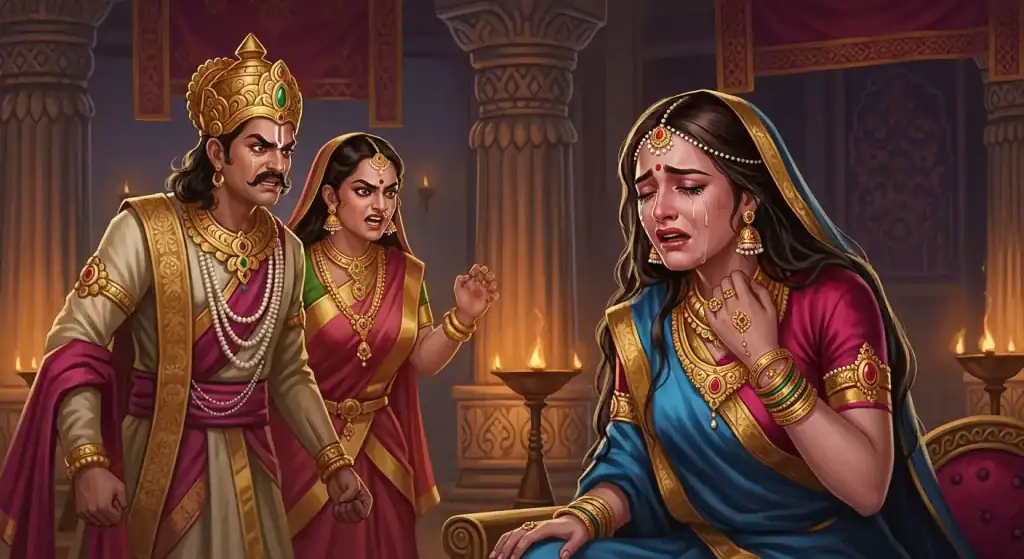
-
Save
In praise of his fame, Pabhavati then spoke:
He twenty thousand brahmins ever feeds, no slave, I swear,
It is Okkaka’s royal son whom thou seest standing there.
He twenty thousand elephants aye yokes, no slave, I swear,
It is Okkaka’s royal son whom thou seest standing there.
He twenty thousand horses ever yokes, no slave, I swear,
It is Okkaka’s royal son whom thou seest standing there.
He twenty thousand chariots ever yokes, no slave, I swear,
It is Okkaka’s royal son whom thou seest standing there.
He twenty thousand royal bulls aye yokes, no slave, I swear,
It is Okkaka’s royal son whom thou seest standing there.
He twenty thousand royal kine aye milks, no slave, I swear,
It is Okkaka’s royal son whom thou seest standing there.
Thus she praised the glory of the Great Being in six stanzas. Her mother, thinking, “She speaks with such confidence, it must be true,” believed her and immediately told the king the whole story. The king came in great haste to Pabhavati and asked, “Is it true, what they say, that king Kusa has come?”
“Yes, dear father. It is seven months to-day that he has been acting as cook to your daughters.”
Not believing her, he questioned the humpback. On hearing the facts, he reproached his daughter with this stanza:
Like elephant as frog disguised,
When this almighty prince came here,
’Twas wrong of thee and ill-advised
To hide it from thy parents dear.
Then, acknowledging his offence, he went in haste to Kusa and spoke this stanza:
In that we failed to recognise
Your majesty in this disguise,
If, Sire, to thee offence we gave,
We would forgiveness humbly crave.
Hearing this, the Great Being thought, “If I speak harshly, his heart will break. I will speak words of comfort,” and, standing among his dishes, recited:
For me to play the scullion’s part was very wrong I own,
Be comforted, it was no fault of thine I was unknown.
The king, comforted, climbed to the palace and summoned Pabhavati to ask Kusa’s pardon, saying:
Go, silly girl, thy pardon from the great king Kusa crave,
His wrath appeased he may be pleased perhaps thy life to save.
Hearing this, Pabhavati went with her sisters and handmaids. Kusa, still in his workman’s dress, saw her and thought, “Today I will humble Pabhavati before me,” and poured water on the ground, trampling it into a thick mass of mud. She drew near, fell at his feet, and grovelled, seeking forgiveness.
The Master clarified:
The goddess-like Pabhavati obeyed her father’s word:
With lowly head she clasped the feet of Kusa, mighty lord.
She then spoke:
My days and nights apart from thee, O king, have passed away:
Behold I stoop to kiss thy feet. From anger cease, I pray.
I promise thee, if thou to me a gracious ear shouldst lend,
Never again in aught I do will I my lord offend.
But if thou shouldst my prayer refuse, my father then will slay
And send his daughter, limb by limb, to warrior kings a prey.
Kusa, wishing to comfort her, replied:
I’ll do thy bidding, lady fair, as far as lies in me;
No anger feel I in my heart. Fear not, Pabhavati.
Hearken, O royal maid, to me, I too make promise true;
Never again will I offend in aught that I may do.
Full many a sorrow I would bear, fair maid, for love of thee,
And slay a host of Madda chiefs to wed Pabhavati.
Swelling with princely pride at seeing her, he thought, “While I live, shall others carry off my bride?” Rousing himself lion-like, he cried:
Go, quickly yoke my well-trained steeds to many a painted car,
And watch me boldly sally forth, to scatter foes afar.
He bade farewell to Pabhavati, saying, “Go bathe and adorn thyself in the palace while I capture thy enemies.” The king of Madda sent councillors to act as a guard of honour, drew a screen around him at the kitchen door, and provided barbers. Once arrayed in splendour and surrounded by escort, Kusa ascended to the palace.
The Master said:
The ladies of king Madda’s court beheld him standing there,
Like rampant lion, as he smites with both his arms the air.
The Madda king then sent him a trained elephant. Kusa mounted it, with a white umbrella held over him, seating Pabhavati behind him. Escorting them were the four arms of the kingdom. Seeing the enemy forces, he roared thrice with the voice of a lion:
Mounted on back of elephant, the queen behind her lord,
Kusa descending to the fray with voice of lion roared.
All beasts, when Kusa’s lion-voice thus roaring loud they hear,
And warrior kings flee from the field, smitten with panic fear.
Life-guardsmen, soldiers, horse and foot, with many a charioteer,
At Kusa’s voice break up and flee, all paralysed with fear.
Sakka right glad at heart looked on in forefront of the fight,
And to king Kusa gave a gem, Verocana ’twas hight.
The battle won, Kusa took the gem, mounted his elephant, and returned to Madda’s town. The captive kings were bound in chains. He proclaimed:
Lo at thy mercy now they lie, in battle smitten sore,
At thy good pleasure slay them all or set them free once more.
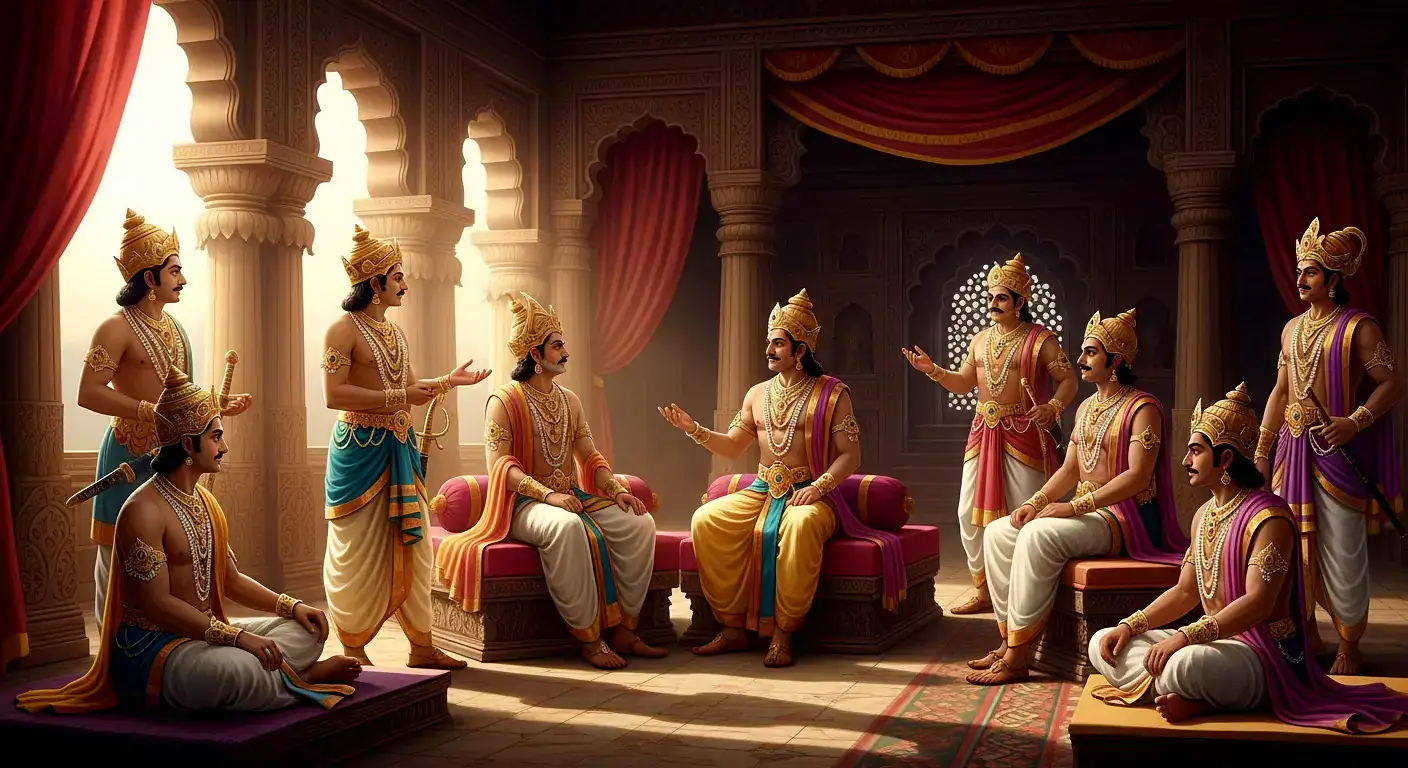
-
Save
The king said:
These foes are rather thine than mine. They all belong to thee,
Thou only art our sovereign lord, to slay or to set free.
Hearing this, the Great Being thought, “What can I do with these men once dead? Let not their coming here be without good result. Pabhavati has seven younger sisters, daughters of king Madda. I will bestow them in marriage upon these seven princes,” and he spoke:
These daughters seven, like heavenly nymphs, are very fair to see,
Give them, one each, to these seven kings, thy sons-in-law to be.
Then the king replied:
O’er us and them thou art supreme, thy purpose to fulfil,
Give them—thou art our sovereign lord—according to thy will.
Thus Kusa had all the princesses beautifully attired and gave them in marriage, one to each of the seven kings.
The Master, to make the matter clear, said in five stanzas:
So Kusa of the lion-voice king Madda’s daughters gave,
One maid to each of princes seven, fair maids to warriors brave.
Delighted with the boon received from lordly Kusa’s hand,
These princes seven returned again each one to his own land,
Taking his magic jewel bright, back to Kusavati,
King Kusa, mighty hero, brought the fair Pabhavati.
Riding together in one car, home came the royal pair,
Neither outshone the other, for they both alike were fair.
Mother came forth to meet her son. Husband henceforth and wife
In realms of peace and plenty dwelt and led a happy life.
The Master, concluding his teaching, revealed the Truths and identified the Birth. At the end of the exposition of the Truths, the backsliding brother was firmly established in the fruition of the First Path. He explained:
“At that time, the father and mother were members of the royal household,
The younger brother was Ananda, the humpbacked attendant was Khujjuttara,
Pabhavati was the mother of Rahula, the retinue were my devoted followers,
King Kusa was I myself.”
Thus did the Master unveil the profound meanings behind the tale, showing how every character and incident reflected the workings of Karma, virtue, and the path to awakening.
Source : The Jataka , E.B. Cowell and W.H.D. Rouse
